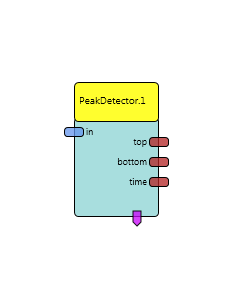PeakDetector
Component Type: Processor (Subcategory: Basic Math)
The Peakdetector component can be used to detect peaks (top values of the signal) and valleys (bottom values) in a signal. Additionally it can calculate the time between two peaks or two valleys or between a peak and a valley. Optionally, top and bottom values can be compared with an average of the most recent top / bottom values - this allows to detect only peaks which are for example greater than 150% of the last 5 averaged peak values.
 PeakDetector plugin
PeakDetector pluginInput Port Description
- in [double]: The incoming signal.
Output Port Description
- top: The peak value of the signal.
- bottom: The bottom value of the signal.
- time: The time in ms or beats per minute (BPM) (depending on the property timeMode) between two peaks (Mode=detect tops), two valleys (Mode=detect bottoms) or a valley and a peak (Mode=detect both) depending on the selected mode in the properties.
Event Trigger Description
- topDetected: The event gets fired if a new top value was detected in the input signal.
- bottomDetected: The event gets fired if a new bottom value was detected in the input signal.
Properties
- mode: Determines which time frame will be used for the time output signal (see description of the output port time).
- comparePeaks:the number of top / bottom values which are taken into account for averaging (0 = disable)
- validTopPercentage:the percentage of the recent averaged top values which constitutes a valid top value (0 = all top values are valid)
- validBottomPercentage:the percentage of the recent averaged bottom values which constitutes a valid bottom value (0 = all bottom values are valid)
- timeMode: Determines the unit for the measured time frame between top/bottom values. Options are beats per minute (BPM) or milliseconds.